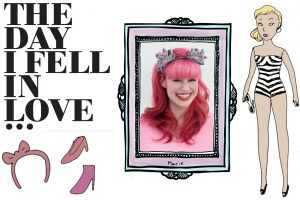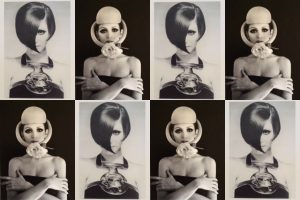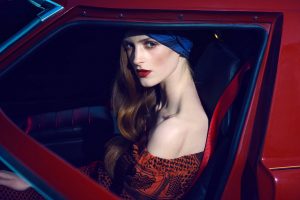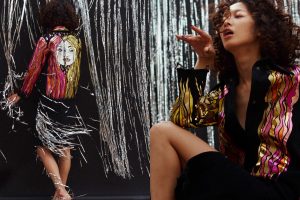Were you more of a good girl or a difficult teenager?
I certainly had my own mind, but because I did not live with my parents [Willy grew up in an orphanage] my circumstances were different. I was a rebel and I must admit that at times I was glad I was in an orphanage and did not hurt people whom I loved or loved me. The people who were taking care of me were merely strangers, so I felt I did not owe them anything. At the same time, I think that if I would have lived with loving parents I would not have had any reason to rebel.
Was there a particular item of clothing you were never seen without?
There was my vintage American army coat I wore all the time because it made me feel really good. It even became a sort of fashion among my friends of the Academy of Fine Arts, where I was studying. Another thing I would never, ever go without was black eye make up. Very black!
What music did you listen to at the time?
There were no Beatles or Rolling Stones or Bob Dylan yet, but I was, and still am, a jazz fan. I listened a lot to Billie Holiday, she was my favorite, as well as Chet Baker, Miles Davis and others. I saw many great jazz artists in concert at that time.
Your teenage style in a few words?
Different, self-made, existentialist.
Outside school, how did you spend your days?
I didn’t have much time outside school as I had to travel from The Hague to Rotterdam everyday to get to class. But as I am a curious person, I liked to visit the museums and exhibitions, read books and magazines, see avant-garde movies, make clothes and go to the café to celebrate life with friends.
What was your relationship to your siblings?
Normal and yet not normal, as we grew up in an orphanage and they were in a different group. Our relationship has always been good, but we were maybe not so close at that time.
How did you organize your social life? Were you part of a group of friends?
Yes, we were a group of friends, artist mostly – writers, painters, sculptors, photographers and so on. We were all so young and some of us still going to school. We would hang out in cafés and drink beer.
Tell us about your biggest act of rebellion.
My biggest rebellion was going to a party I was not allowed to go to. I had to steal the key of the entrance so I could come back during the night and then slipped away. It was a great party and all went well, but then one of the girls at the orphanage – jealous I guess – told on me, and I ended up spending three months in a reform school in an old castle where at night we slept in a cell… Long story.
What was your greatest ambition at the time?
My ambition was to see the world. I dreamt of going different places… and I did. Another long story!
From there, how did you finally end up in fashion and work with Helmut Newton?
When I decided to be a model and went to London in 1967, my agency sent me to Vogue. I told the Editor-in-Chief that I liked Helmut Newton’s pictures and that I would like to work with him. I was 26. The next time Helmut came to London, I was introduced to him at the Vogue office and from there on I was booked with him almost every day, in London as well as in Paris. On our first shoot, which was for Vogue, he said I was a natural…



